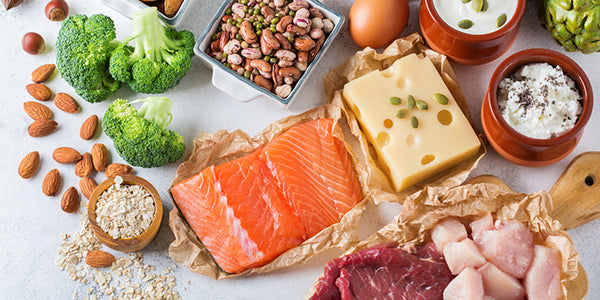
No matter what your goals are, these 10 best superfoods for men, being whole and nutritious, will help you get the results you want! Build a strong body, mind, and life with these best superfoods for men!
Top 10 Superfoods for Men
1. Barley
Being a whole grain, barley comes with some serious health benefits thanks to its burly supply of fiber, zinc, iron, manganese, selenium, copper, phosphorus, magnesium, and niacin.
A large meta-analysis published in the BMJ found consuming 90 grams of whole grains daily, or about three servings, is associated with a reduced risk of coronary heart disease, cardiovascular disease, and death from all causes. Furthermore, even eating two daily servings can reduce the risk of dying prematurely from any cause by 15 percent!
Men can also shake up their whole grain repertoire with oats, brown rice, and whole grain breads and pastas.
2. Almonds
Almonds are one power-packed nut, gifting its consumers' ample protein, fiber, monounsaturated fat, calcium, magnesium, manganese, and vitamin E.
In fact, an ounce of almonds supplies almost 40 percent of the recommended daily intake of vitamin E, a fat-soluble vitamin and potent antioxidant to reduce inflammation in the body. Vitamin E supports skin, eye, and heart health, along with improving pregnancy rates for men with fertility problems and lower the risk of prostate cancer.
There is also evidence denoting almonds play a role in weight loss and management. Nonetheless, the nut upkeeps heart, bone, brain, and overall health.
3. Broccoli
Broccoli and other cruciferous veggies are full of fiber, potassium, vitamins C, B6, and A, and certain plant compounds such as lutein and sulforaphane.
The nutrients in broccoli can help lower the risk of diabetes and heart disease. Moreover, a study published in the American Journal of Clinical Nutrition also found an increase consumption of vegetables, particularly cruciferous veggies, and fruit promote cardiovascular health and overall longevity.
Broccoli may also mend fertility and reduce the risk of certain forms of cancer, prostate and colon cancers included.
4. Tomatoes
Tomatoes are one of the best superfoods for men, as they are ample in fiber, vitamins A and C, potassium, and folate.
They are also one of the richest sources of lycopene, the naturally-occurring compound found in tomatoes that provide its red color. Lycopene bares some pretty impressive benefits, including reducing blood pressure, supporting the immune system, and protecting skin and bone health.
Specific to men's health, lycopene has proven to improve sperm parameters and pregnancy rates and low the risk of prostate cancer.
5. Eggs
While eggs were scrutinized in the past, it is now known such concern was not exactly as cracked up to be. In fact, more pronounced data redirects the cautions to other dietary factors, including sugar intake, thus lifting the weight off the cholesterol-containing egg.
The yolk is also one of the few natural sources of vitamin D, shown to promote a healthy weight, muscle growth, testosterone and sperm counts, and erectile function, in addition to improving bone and brain health.
6. Chicken
But let's not forget the chicken…
There is no denying chicken is a staple of protein sources, though it is also a rich source of niacin, selenium, phosphorus, choline, pantothenic acid, and vitamins B6 and 12.
Protein proves to be a common denominator for a strong physique, and especially when paired with resistance training, there is evidence the duo can increase testosterone levels.
7. Oysters
Oysters are a promoted aphrodisiac, or "love drug," which is a food that stimulates sexual desire or increases pleasure and performance.
But do oysters actually stand up to its hype or just a Valentine's Day ploy?
Although researchers question whether or not oysters actually are that love drug, they are a significant source of zinc, which is an essential nutrient for testosterone production, and contain specific amino acids and serotonin, all nutrients involved in sex drive.
But beyond their sexual innuendo, oysters are bursting with protein, iron, selenium, vitamins D and B12, amongst other nutrients, which may play valuable roles in wound healing, immune functions, heart and bone health.
8. Grassfed Beef
First thing's first: Whereas red meat does raise question regarding its association to colorectal, prostate, and pancreatic cancers, there is evidence suggesting red meats can fit into a balanced diet once or twice per week.
In fact, research shows adopting a Mediterranean-style eating pattern, with or without reductions in red meat intake when red meats are lean and unprocessed, can improve risk factors associated to heart disease.
Beef is a rich supplier of essential nutrients, including protein, iron, and zinc. Furthermore, choosing grassfed beef reduces the saturated fat content and increases polyunsaturated fats (PUFAs) and omega-3 fatty acids, which may offer anti-inflammatory properties and lower the risk of chronic disease.
9. Beans
Remember, while red meat can fit into a balanced diet, men are encouraged to balance out meat intake with plant-based protein sources.
Beans are notorious for their protein content, along with supplying fiber, folate and are low on the glycemic index (GI) scale, which helps promote weight loss.
Related to their fiber content and various phytochemicals (plant chemicals) beans supply, the legume has shown to decrease the risk of breast and various forms of cancer.
10. Edamame
Edamame are young soybeans harvested prematurely before they start to harden.
But wait, doesn't soy reduce male testosterone?
A meta-analysis published in Fertility and Sterility helps clear the air and advocates soy foods do not have an effect on testosterone concentrations in men.
Furthermore, incorporating more natural sources of soy can reduce the risk of a number of chronic diseases thanks to its plant-based protein, fiber, unsaturated fats, magnesium, folate, calcium, potassium, iron, and other nutrients it supplies.
And not to mention, another meta-analysis published in the American Journal of Clinical Nutrition suggests consuming soy foods is associated with a reduction in prostate cancer, which is one of the leading causes of cancer death among men.







